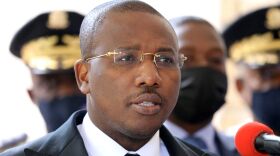
Lulu Garcia-Navarro
Lulu Garcia-Navarro is the host of Weekend Edition Sunday and one of the hosts of NPR's morning news podcast Up First. She is infamous in the IT department of NPR for losing laptops to bullets, hurricanes, and bomb blasts.
Before joining the Sunday morning team, she served as an NPR correspondent based in Brazil, Israel, Mexico, and Iraq. She was one of the first reporters to enter Libya after the 2011 Arab Spring uprising began and spent months painting a deep and vivid portrait of a country at war. Often at great personal risk, Garcia-Navarro captured history in the making with stunning insight, courage, and humanity.
For her work covering the Arab Spring, Garcia-Navarro was awarded a 2011 George Foster Peabody Award, a Lowell Thomas Award from the Overseas Press Club, an Edward R. Murrow Award from the Corporation for Public Broadcasting, and the Alliance for Women and the Media's Gracie Award for Outstanding Individual Achievement. She contributed to NPR News reporting on Iraq, which was recognized with a 2005 Peabody Award and a 2007 Alfred I. duPont-Columbia University Silver Baton. She has also won awards for her work on migration in Mexico and the Amazon in Brazil.
Since joining Weekend Edition Sunday, Garcia-Navarro and her team have also received a Gracie for their coverage of the #MeToo movement. She's hard at work making sure Weekend Edition brings in the voices of those who will surprise, delight, and move you, wherever they might be found.
Garcia-Navarro got her start in journalism as a freelancer with the BBC World Service and Voice of America. She later became a producer for Associated Press Television News before transitioning to AP Radio. While there, Garcia-Navarro covered post-Sept. 11 events in Afghanistan and developments in Jerusalem. She was posted for the AP to Iraq before the U.S.-led invasion, where she stayed covering the conflict.
Garcia-Navarro holds a Bachelor of Science degree in international relations from Georgetown University and an Master of Arts degree in journalism from City University in London.
-
Claude Joseph is one of three men with claims to power in Haiti. He says he's been in talks with the others about resolving the dispute amid the investigation into the president's assassination.
-
NPR's Lulu Garcia-Navarro speaks with Claude Joseph, the interim prime minister of Haiti, who was about to be replaced the day of the assassination of President Jovenel Moïse.
-
Female gymnasts from Germany wore full-length unitards instead of leotards in a recent competition. Psychology professor Elizabeth Daniels says it's a statement about comfort over outward appearance.
-
Upset routines and unhealthy parental habits have sapped children's fitness, says pediatric nurse practitioner Suzannah Stivison. She offers ways parents can help promote healthier habits.
-
As the 10-year anniversary of the war approaches, a new book from the photojournalist Bassam Khabieh shares moments of normalcy and resilience against a backdrop of violence, displacement and fear.
-
Carol Burnett, who heads an advocacy group for child care centers, says the funds will help mothers enormously — "whether they're trying to get out of poverty" or "find a pathway to higher income."
-
Vaccination programs work best when as many people as possible get vaccinated, but Latinos are getting inoculated at lower rates. A group that helps immigrant workers is working to change that.
-
In Washington, D.C., hospital staff vaccinated 1,750 public school workers in one day. It was a hard-won success amid a fragmented nationwide vaccination campaign fraught with challenges.
-
Plaskett, a House manager in former President Trump's Senate trial, defends the decision not to call witnesses. "As all Americans believed at that moment, the evidence was overwhelming," she says.
-
Staff at Cedars-Sinai in LA got a surprise from a former COVID-19 patient last week: 800 homemade tamales. Margarita Montanez spent five days making them as a "thank you" for her care last spring.








